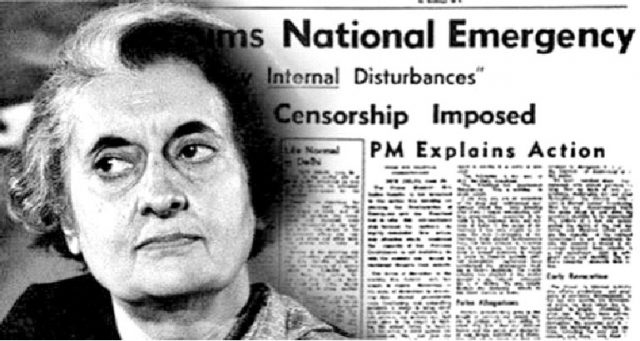
“The National Herald, founded by Jawaharlal Nehru, supported the Emergency throughout, and cautiously removed the quote ‘Freedom is in peril, defend it with all your might’ from its masthead.” ― Coomi Kapoor, The Emergency: A Personal History, Penguin, 2016
The National Emergency proclaimed on June 25, 1975 by the then Prime Minister Smt Indira Gandhi by a Presidential Ordinance is often referred to as the ‘Darkest period of Democracy in Bharat’. It is a right time to revisit the most horrific phase in democracy of Bharat on its anniversary.
Recently, many politicians and some media persons hurled allegation of ‘creating Emergency like situation’, against the present dispensation. The heir of dynastic politics, Rahul Gandhi while launching the commemorative edition of National Herald went on to say that ‘this Government is forcing everyone into silence, but National Herald has a spirit—a very strong spirit and it will not be silenced’, forgetting the fact that the same National Herald had silently supported the Emergency and is now caught into the allegations of financial irregularities, thanks to the family appropriation.
It is also necessary to remind the real horrors of Emergency for media persons and especially youngsters who are active on digital platforms and may not be able to connect with the draconian period. This may create the impression that any investigation by Government agencies against a media house or a company pertaining to financial irregularity or speaking against anti-national
sloganeering or against the people, who stand for terrorism and terrorists, is known as Emergency.
So in the late hours of June 25, 1975, with the advice of Smt Gandhi, the then President Fakhruddin Ali Ahmed, promulgated National Emergency under Article 352 of the Constitution, under the pretext of “the security of India is threatened by internal disturbance”. The real reason was the conviction of Smt Gandhi in the Allahabad High Court on June 12, 1975, in a case related to electoral malpractices. Even before the Ordinance was accepted by the Cabinet and Emergency was declared formally,—on the night of June 25-26, 1975—police arrested all major Opposition leaders, including Jaiprakash Narayan. Civil liberties were suspended, and amendments were brought in that threatened to alter the basic character of the Constitution and draconian laws like MISA were strengthened. More than eight democratically elected State governments led by non-Congress parties were toppled on a single day (April 29, 1977).
What happened on the media front was more gruesome. Strict censorship was imposed on the Press and any form of protest against Emergency by newspapers (editors) was curbed through the means of financial restrictions or brutal force. Most of the newspapers, including Organiser Weekly, came to a standstill because the Government had cut-off their electricity supplies to make them “fall in line”. Several foreign correspondents were removed and accreditation of more than 40 reporters was withdrawn. Radio and Doordarshan, having a complete monopoly of the State, were used as propaganda machinery. If all this was not sufficient, four private news agencies were forced to merge in a single entity, to make the news monitoring job easier.
Even social and patriotic organisations like the RSS was banned and thousands of Swayamesevaks were arrested. Though many fought through satyagraha and underground methods, some went missing, some families are still not able to come out of the trauma of this deadly assault on democracy.
If this was the real Emergency then what is it that we are experiencing today? The reality is, the spill-over effect of Emergency remained even after the 21—month period of uncivil rule was over. Controlling media through advertisement policies or plundering Government resources for personal interests, became a norm. This was also used to establish certain narratives about Bharat and our national identity. Terms like ‘secularism’ and ‘human rights’ were wrongly established to justify communal acts of vote-bank politics and to protect violent, anti-national activities. With the arrival of social media, all this is under scanner. It is not the Government or its agencies, but common people active on digital platforms, now popularly known as trolls, are questioning this status-quo. The political change at the Centre is also part of this changing narrative which is not acceptable to many.
It is true that ‘the price of freedom is eternal vigilance’, at the same time we should keep in mind that every piece of rope is not a snake. More importantly such hallucination may lead us to lose the sight of the real snake, that is why this reminder.
@PrafullaKetkar
Courtesy: Organiser














